The building management of our AirBnb in Tokyo tried to chase us out – here’s what we did
Our recent trip to Japan was eventful, and this was probably the highlight of our trip. Here is the story of how the building management of our Airbnb in Tokyo tried to chase us out and what we did.
It had been raining heavily in Tokyo that week. We arrived back to our room at about 10.30pm, with our shoes soaked. It was the second of four nights we had booked our Airbnb for. All we wanted was a warm shower and a good night’s sleep. Then, right at the door of our Airbnb was a notice saying that our stay was not permitted, instructing us to ‘Go away from here quickly!!’.
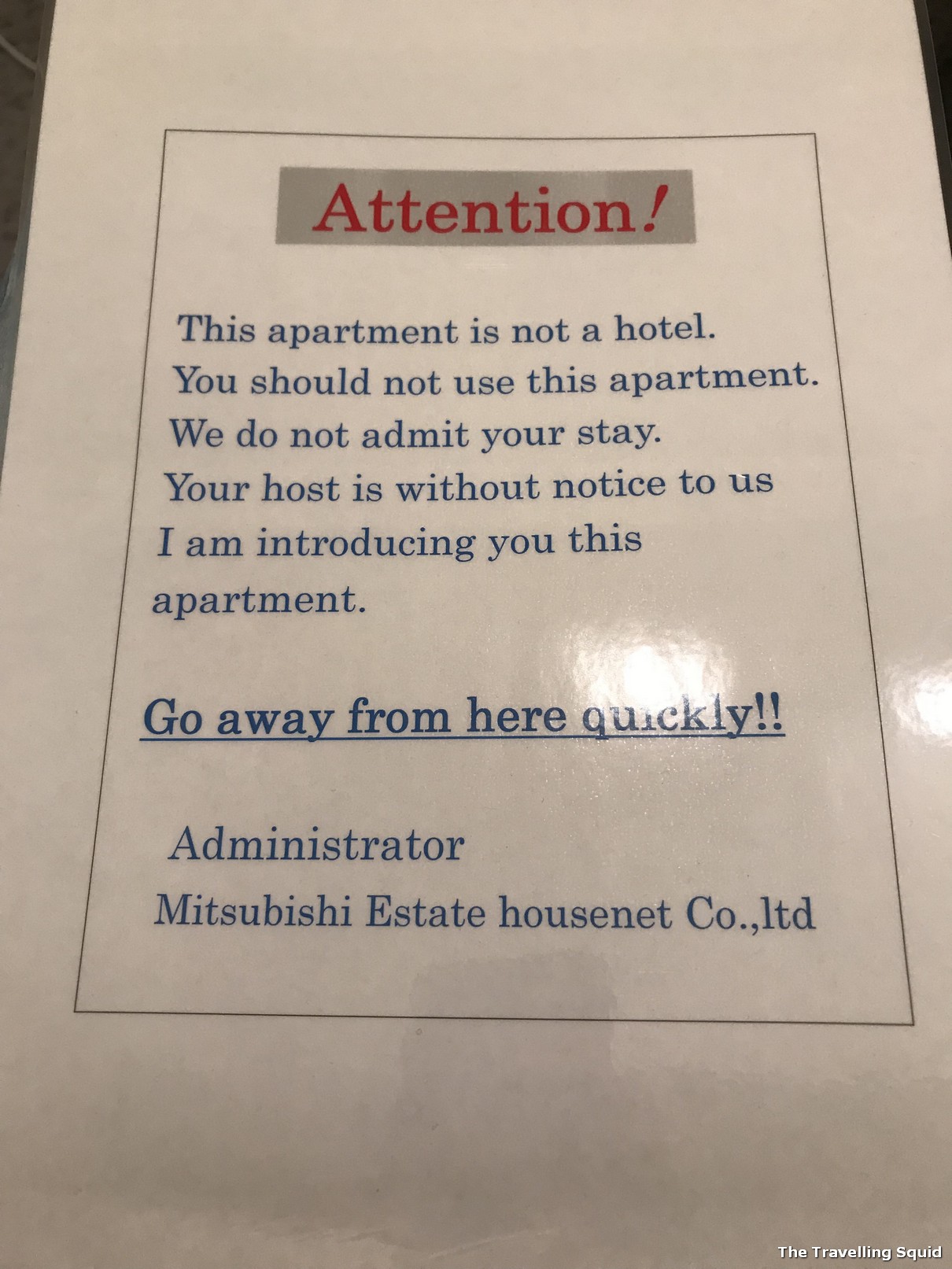
Now I wouldn’t consider S and I worriers, but the notice was quite alarming. The immediate thought was what if the building management was waiting to confront us and chase us out that very night? The prices of hotels in the Shinjuku area were high and any last-minute bookings for three nights would have cost us more than a thousand dollars.
We tried to contact our host frantically using the emergency number she had given us. But there was no response. I decided to take a shower to relax and think this through clearly.
First, if the building management was determined to chase us out that very night, they would have been waiting for us in person upon arrival. Second, the onus was on our Airbnb host to speak to them, not us. In principle, we should only leave when instructed by our host, Doing so will also entitle us to a full refund from Airbnb.
For a peace of mind, we could have moved to a nearby hotel, but based on reviews about Airbnb, it was unlikely they would give us a refund. What would entitle us a refund was face to face interaction with the building management, which could serve as evidence that they had made our stay difficult and unbearable.
As our Airbnb host was uncontactable at that point, there was nothing much which could be done. But since the building management, Mitsubishi Estate had ‘plastered’ a notice on our door in English, we had the right of reply.
Armed with a fountain pen and good fountain pen paper we had purchased from Tokyu Hands, we proceeded to write a note back to the building management, with the following considerations in mind:
- The note was a very rude by international standards and even more so by Japanese standards. This was especially so given the fact that the building management should be contacting our Airbnb host, and not harassing the occupants of the apartment.
- We should not stoop to the level of the building management. There were a million mean remarks which we could have included in the note, but we decided that sarcasm would work best. This is especially since a) the Japanese are not known for not being able to detect sarcasm, and b) the building management should reflect inwardly how inappropriate their behaviour was. The best way to achieve that was to be sarcastic yet seemingly polite. Hence the note below. We didn’t have scotch tape with us and the only option to stick our note was to use (aptly) plasters.
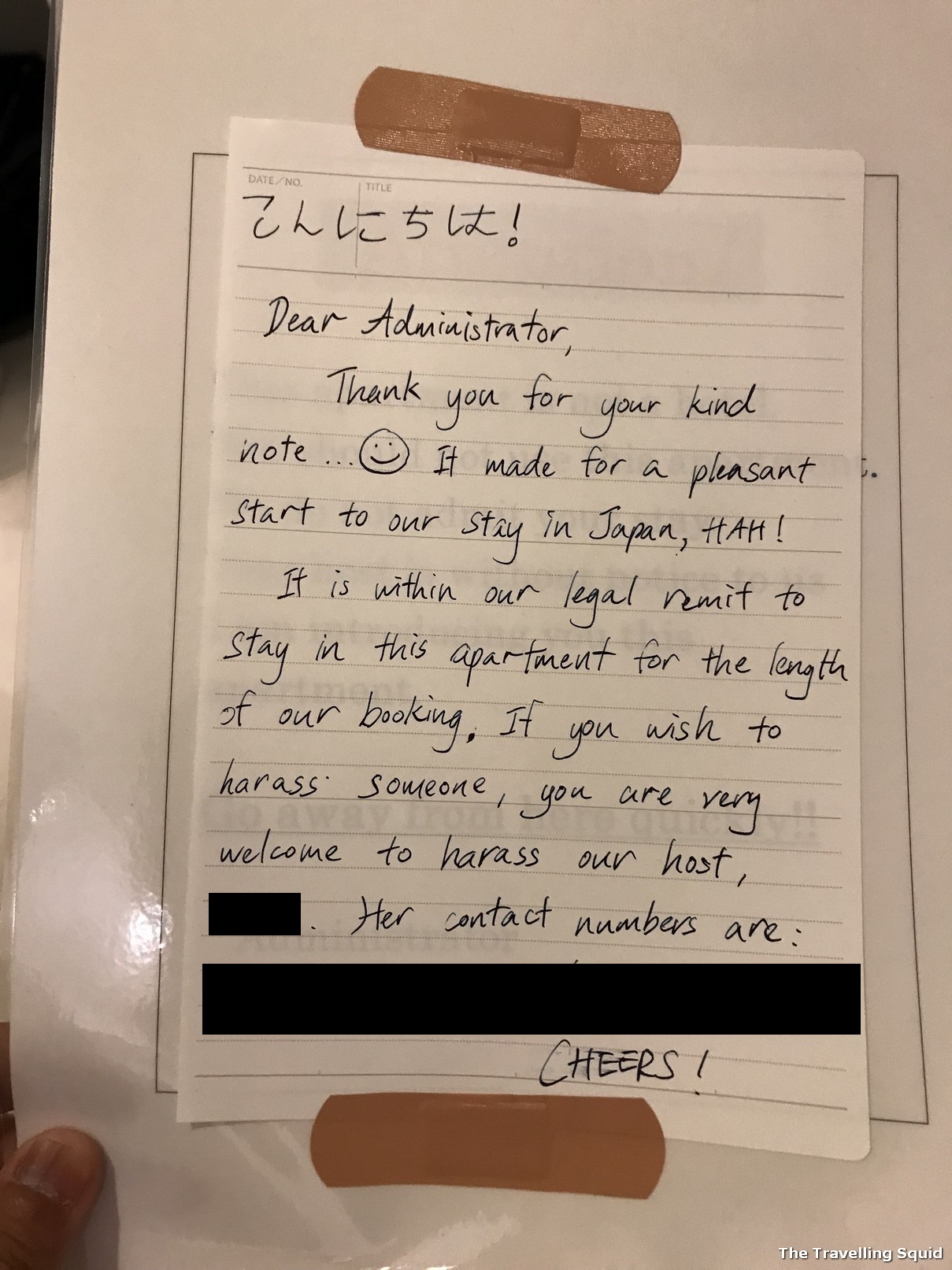
No one came knocking on our door the next morning to chase us out. Our Airbnb host replied later at 1am, apologising for the slow response as she was overseas. She said it was perfectly legal for us to stay in the Airbnb. There have been some disagreements with the building’s Strata Council, with half of the residents supportive of Airbnb rentals, while the other half in disagreement. A decision had not been made. The council was due to meet later this month. Our host said she will contact Mitsubishi Estate on our behalf.
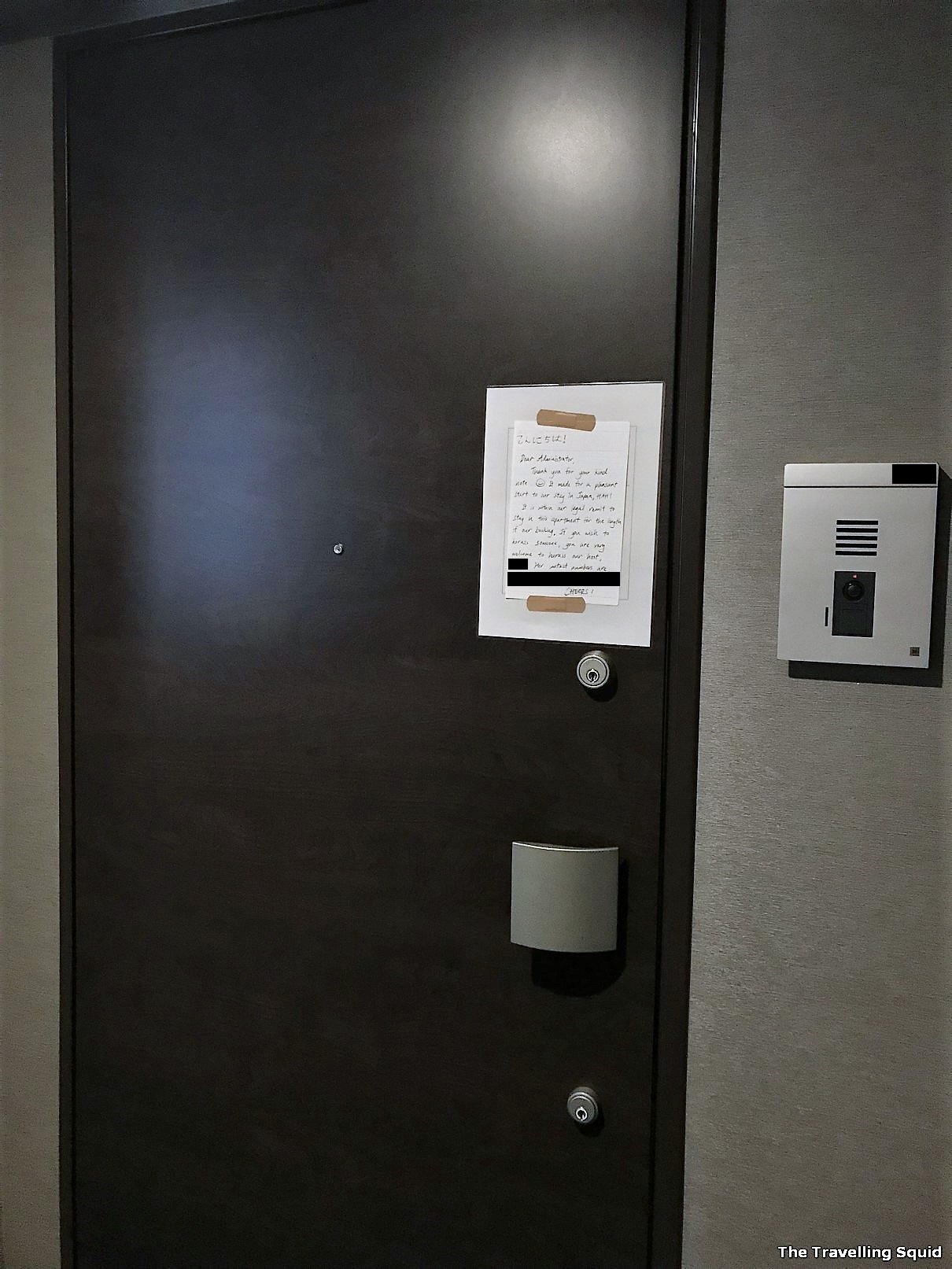
Our note was still stuck to the door when we left that morning. When we returned that evening, the note and the plasters which held it in place were gone but Mitsubishi Estate’s notice remained. We decided to remove the notice from the door. No one else came to harass us after that.
So, is Airbnb allowed in Japan?
We did some homework after being threatened by the notice, and here are findings from this Japan Times article, which are rather useful. This is probably more relevant for stays after 15 June 2018. However even with these guidelines, it is still not a blanket approval. It does however point towards the fact that Airbnb rentals in Japan will be made easier in the future.
- In Japan, a new law will go into effect in June 2018 to regulate minpaku, private residences rented out by their owners as short-term lodgings. The new minpaku law will lower the legal hurdles for renting out properties as short-term lodgings. Currently, only certain specially designated districts allow minpaku rentals, but after 15 June 2018, in principle, minpaku rentals will be permitted throughout Japan. There will no longer be limitations on room size. Nor will representatives of owners be required to be present on the premises.
- Local governments, however, can also implement their own restrictions and conditions. Kyoto, for instance, will mostly prohibit minpaku from being operated in residential areas.
- One of the new conditions of the law is that people who wish to rent out properties as minpaku must register with the land ministry. According to Japan Times, the ministry is already accepting registrations, so presumably owners can start renting out rooms when the law goes into effect.
- Probably the most contentious aspect of the new law is that it contains no restrictions with regard to the type of property that can be used. One of the main sources of complaints about Airbnb rentals has been condominium owners and tenants who object to neighboring units being used as de facto hotel rooms without their approval. The new law will not expressly address this problem, but the land ministry has drawn up guidelines for owners associations that wish to ban minpaku from their buildings.
- Associations can ban minpaku, but after June 15 they must include any prohibitions in their own sets of rules and regulations, otherwise they will not be legally binding.
- And according to the law, since associations must gain three-fourths approval of their voting members to amend their rules, adding such prohibitions could be difficult. Presently, under the special district rule, minpaku can still be banned by condo associations without any kind of formal declaration in writing.
The Travelling Squid’s Take
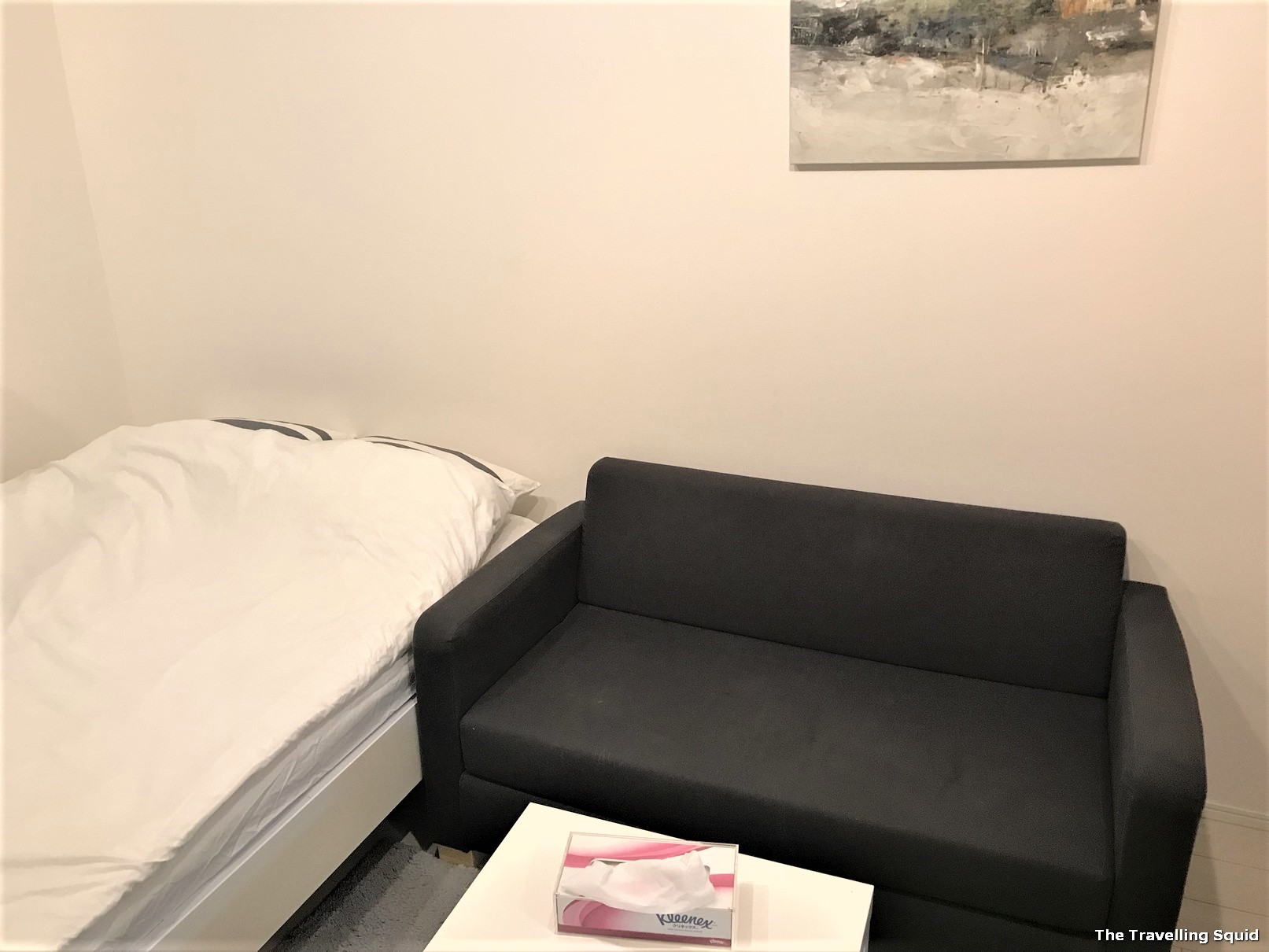
To be fair, the Airbnb in Shinjuku was pretty comfortable and convenient. We would have recommended it to friends, if not for the unkind notice put up by the building management, Mitsubishi Estate. While our note to the building management did seem to have some effect, I think we would stay in a hotel the next time we visit Tokyo. Also, the dispute that we faced did not seem like the first occurrence of a disagreement between the administrator and our host. She could have done us the courtesy of being frank about the possible disturbance beforehand, and also being on standby for such incidents; being “abroad, and unfortunately not contactable” reeks of laziness.
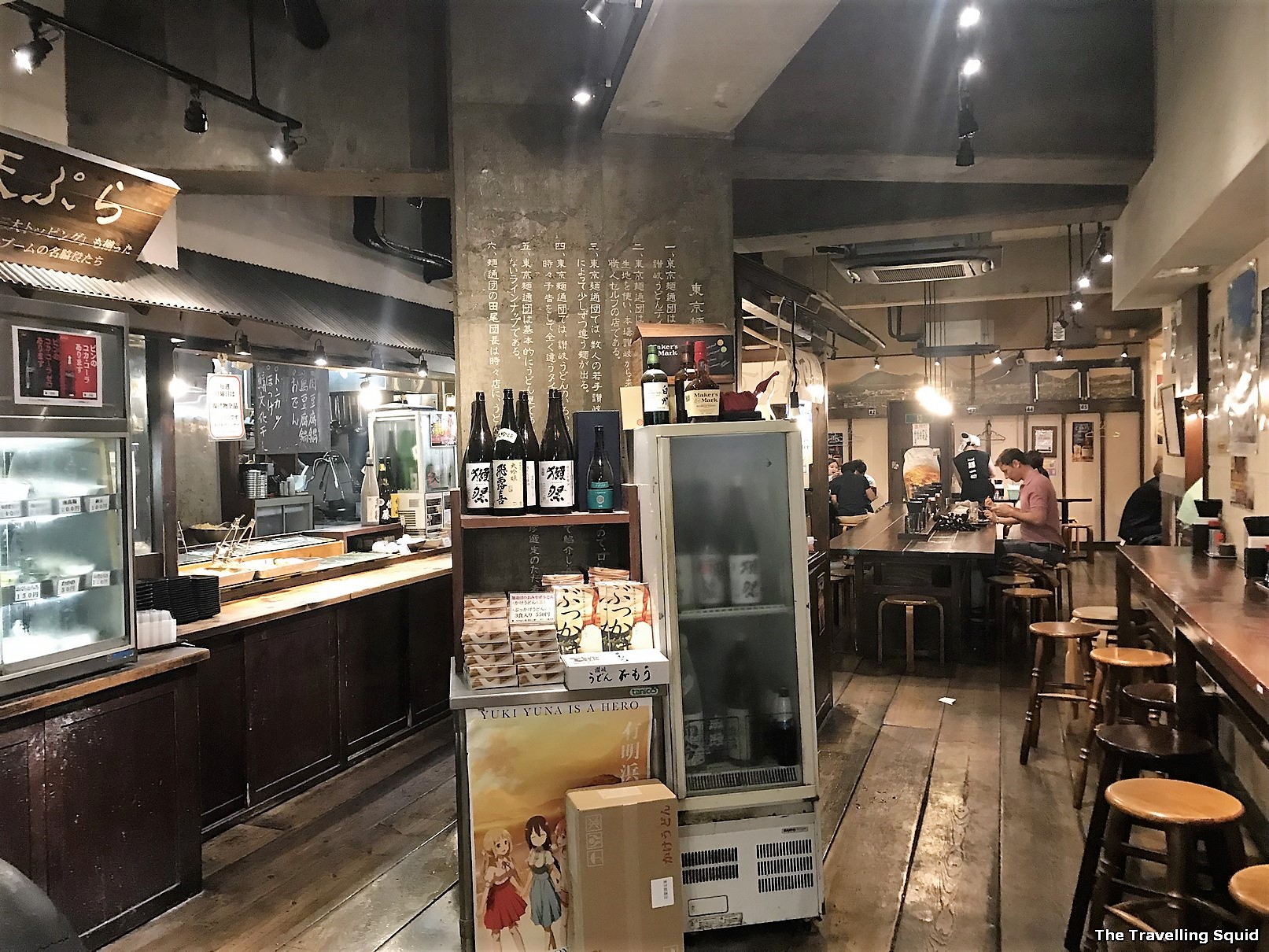
Have you encountered any problems with your Airbnb in Japan? Do drop a comment below.





